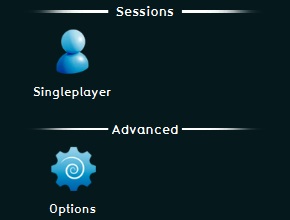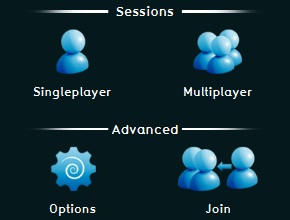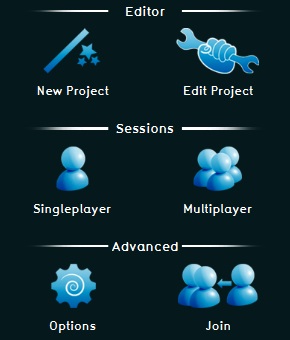Account management: Difference between revisions
Jump to navigation
Jump to search
| Line 110: | Line 110: | ||
==User accounts are grouped under a domain== | ==User accounts are grouped under a domain== | ||
[[File:AccountManagementLogo2.jpg|right|frame|User Domain Groups]] | [[File:AccountManagementLogo2.jpg|right|frame|User Domain Groups]] | ||
: User accounts are grouped under a "domain" (=user group). This is a convenient manner to ensure that users from a certain group can only access the games assigned to their domain. This to avoid competitors to be able to sea each others games for example, or to avoid caustic behaviour such as editing or deleting games from other user groups. It is possible to share games between groups, but only for playing the game, editing can only be done by users from the same domain as where the game project originates from. | |||
: Please note that the licensing is also linked to the domain; a domain receives a license, not the users individually! | |||
==User license types== | ==User license types== | ||
==Changing user account and user domain details== | ==Changing user account and user domain details== | ||
Revision as of 13:40, 17 October 2014
This article is a stub.
After reading this page:
- you've learned about user account management
- you've learned about the different account types in the Tygron Engine
- you've learned how accounts relate to their domain
- you've learned about the different license types
- you've learned how to change user account details
File:AccountManagementLogo1.jpg
User Account management
- User management is the process that focuses on the administration of users of IT and information systems. This process manages the registration of users and the authorisation of their roles within a system. Authorised access is secured with a user specific login name and password.
- User Management can control, for example:
- The projects a user can access
- Whether access to that project is read-only
- If a user can update his credentials (login, password)
- If a user can update relevant project data
- If a user can host or join a session with other users
Different account types in the Tygron Web Application
- The Tygron Web Application uses account management to enable user access to their proper projects, and with the required rights to perform the actions desired. To ensure that users have access to their assigned projects, and their assigned projects only, users are grouped in so called user domain groups (="domain"). Within a domain, users can have different roles, or account types, assigned. These types or roles determine the actions a user can perform within his domain. These different account types are described below:
Invite Only
- The Invite Only account type is the account type with the lowest access level. When using this type, the user can only be invited to a session. Within the domain at least one Multiplayer account type must be available, to be able to host sessions where Invite Only accounts can be joined to. The user can only perform a minimum of actions, such as:
- Run the hardware benchmark test
- Call up online support resources, such as the Wiki and Forum
- Read the Legal Notices
- Log out of the Tygron Web Application
Single Player
- With this account type it is allowed to start available games in Single Player or Demo mode besides the options available for the Join Only account type. Thois account is used when there are both single player and multiplayer games available in the domain, however, it is desired to restrict access to only the single player project(s) for one or more users within the domain.
- With this account type users can:
- Run the hardware benchmark test
- Call up online support resources, such as the Wiki and Forum
- Read the Legal Notices
- Change user account details (name, family name & password)
- Log out of the Tygron Web Application
- Start a game session in Single Player or Demo mode
Multiplayer
- The Multiplayer account is used for hosting and joining game sessions for multiple players. With this account type a user can select, besides the same options as the Single Player account, to host a new or previously saved multiplayer game session, or to join an already active multiplayer game session. This is the most common account for the general purpose of playing multiplayer games.
- With this account type users can:
- Run the hardware benchmark test
- Call up online support resources, such as the Wiki and Forum
- Read the Legal Notices
- Change user account details (name, family name & password)
- Log out of the Tygron Web Application
- Start a game session in Single Player or Demo mode
- Host a new or already saved multiplayer game session
- Join an already active multiplayer game session (hosted by someone else)
Editor
- This account type has the same options available as the Multiplayer account type. This account type can also create new games, edit existing games, or join others within the same domain, in an editing session.
- With this account type users can:
- Run the hardware benchmark test
- Call up online support resources, such as the Wiki and Forum
- Read the Legal Notices
- Change user account details (name, family name & password)
- Log out of the Tygron Web Application
- Start a game session in Single Player or Demo mode
- Host a new or already saved multiplayer game session
- Join an already active multiplayer game session (hosted by someone else)
- Create a new or edit an already saved game project
- Join an already active editor session with another user within the same domain
Group Admin
- The Group Admin account has the highest access level available to end users of the Tygron Engine. This account has all the perks of the Multiplayer account plus the options to manage all the users in the domain, manage the available projects within the domain, manage the active sessions within the domain and the license for the domain. If no group admin account is available within a domain, this role is being taken care of by Tygron Customer Support.
- With this account type users can:
- Run the hardware benchmark test
- Call up online support resources, such as the Wiki and Forum
- Read the Legal Notices
- Change user account details (name, family name & password)
- Log out of the Tygron Web Application
- Start a game session in Single Player or Demo mode
- Host a new or already saved multiplayer game session
- Join an already active multiplayer game session (hosted by someone else)
- Create a new or edit an already saved game project
- Join an already active editor session with another user within the same domain
- Create or change users within the domain
- Manage the projects within a domain
- Manage active sessions within a domain
- Change the license of the domain
| Account Type | Description | Available options in main menu |
|---|---|---|
| INVITE_ONLY | This account can only be invited to a multi player session | Invite only |
| SINGLEPLAYER | This account can only access Demo and Single Player games | 
|
| MULTIPLAYER | This account can start and join multiplayer sessions, including the inviting of INVITE_ONLY accounts | 
|
| EDITOR | This account type can, besides hosting and playing multiplayer games, create and edit its own games | 
|
| GROUP_ADMIN | This account is the highest access level available to users. With this account you can also manage other accounts from your user group. | 
|
User accounts are grouped under a domain
File:AccountManagementLogo2.jpg
User Domain Groups
- User accounts are grouped under a "domain" (=user group). This is a convenient manner to ensure that users from a certain group can only access the games assigned to their domain. This to avoid competitors to be able to sea each others games for example, or to avoid caustic behaviour such as editing or deleting games from other user groups. It is possible to share games between groups, but only for playing the game, editing can only be done by users from the same domain as where the game project originates from.
- Please note that the licensing is also linked to the domain; a domain receives a license, not the users individually!
